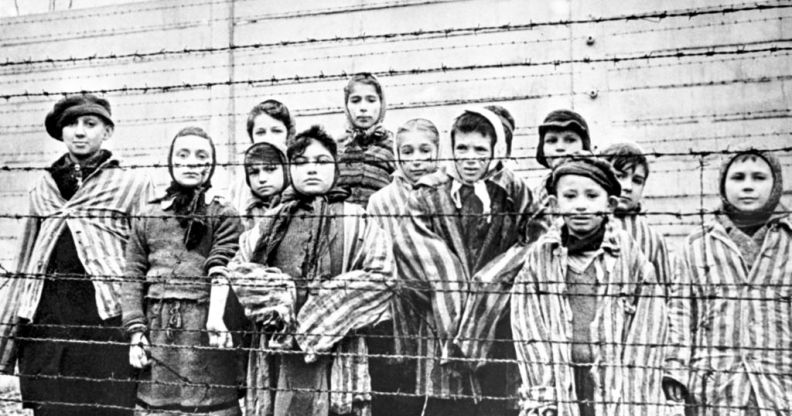Facebook’s algorithm ‘actively promotes’ Holocaust denial content and conspiracy theories, experts say

A group of child survivors behind a barbed wire fence at the Nazi concentration camp at Auschwitz-Birkenau in southern Poland, on the day of the camp’s liberation by the Red Army, 27th January 1945. (Captain Alexander Vorontsov/Getty)
Facebook’s algorithm “actively promotes” Holocaust denial content, according to an investigation by a UK-based anti-extremism organisation.
The Institute for Strategic Dialogue (ISD) found that searching the word “Holocaust” on Facebook leads users to denial pages and groups, The Guardian reports.
Many of these pages feature links to publishers that sell Holocaust-denial books and harmful revisionist literature that downplay the horrors of the genocide.
The Facebook search tool also leads users to pages dedicated to the British Holocaust denier David Irving, who was arrested in Austria in 2005 for his harmful views.
It is estimated that up to 17 million people were exterminated during the Holocaust, with six million Jews included in that number.
LGBT+ people were also targeted during the Holocaust with an estimated 100,000 men arrested for homosexuality in Nazi Germany between 1933 and 1945. Of those, 50,000 were sentenced for their “crimes” and an estimated 5,000-15,000 were sent to concentration camps.
Holocaust denial ‘delegitimises the suffering of the Jewish people’.
The ISD investigation found that at least 36 Facebook groups with a combined following of 366,068 were dedicated to Holocaust-denial or hosted misinformation on the subject.
Furthermore, researchers with the institute said that when they followed these public Facebook pages, the social media platform recommended similar content that denied the genocide.
The ISD’s senior research manager Jacob Davey said: “Facebook’s decision to allow Holocaust denial content to remain on its platform is framed under the guise of protecting legitimate historical debate, but this misses the reason why people engage in Holocaust denial in the first place.
“Denial of the Holocaust is a deliberate tool used to delegitimise the suffering of the Jewish people and perpetuate long-standing antisemitic tropes, and when people explicitly do this it should be seen as an act of hatred.”
The investigation also found that Holocaust-denier material is not limited to Facebook. They discovered 2,300 such posts on Reddit, 19,000 on Twitter, and 9,500 on YouTube that were created in the last two years alone.
However, the group noted that there was a sharp decrease in material denying the genocide posted to YouTube after the platform banned such content last year.
Jakob Guhl, research coordinator with the ISD, said: “Our findings show that the actions taken by platforms can effectively reduce the volume and visibility of this type of antisemitic content.
“These companies therefore need to ask themselves what type of platform they would like to be: one that earns money by allowing Holocaust denial to flourish, or one that takes a principled stand against it.”
Facebook does not remove content ‘simply for being untruthful’.
In a statement provided to PinkNews, a Facebook spokesperson said they have requested further information from the ISD’s investigation so they can look into the pages and groups identified.
The social media platform noted that Holocaust denial has been banned in a number of countries across the world, such as Germany, France and Poland – but the UK and the US have refused to do so.
Facebook said they do not allow posts that celebrate, defend or justify the genocide – but said they do not automatically remove Holocaust-denier content.
A spokesperson said: “We take down any post that celebrates, defends, or attempts to justify the Holocaust. The same goes for any content that mocks Holocaust victims, accuses victims of lying, spews hate, or advocates for violence against Jewish people in any way.
“We also remove groups and pages that discuss Holocaust denial from recommendations and references to it in search predictions.
“While we do not take down content simply for being untruthful, many posts that deny the Holocaust often violate our policies against hate speech and are removed.
The spokesperson added: “Striking the right balance between keeping people safe and allowing free speech is difficult and we know many people strongly disagree with our position. We are constantly developing and reviewing our policies and consulting with organisations around the world to ensure we’re getting it right.”

